Archives - Page 6
-
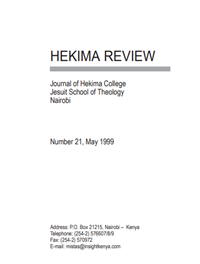
Hekima Review No. 21 (May 1999)
In these last days of the second millennium, perhaps one message the whole of humanity is dying to hear and digest is that we are One World. To this Bob Marley would add the natural consequence: “…let’s get together and feel all right!” We have harped for so long at our superficial differences. We have enslaved, we have colonized and would re-colonize, and we do exploit, deplete, pollute, embezzle, bribe, rape, and massacre to hold on to one passing difference or another.
-
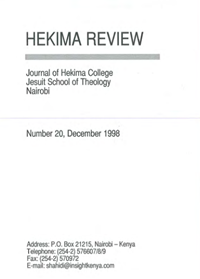
Hekima Review No. 20 (Dec 1998)
It may be paradoxical, but the stark reality shows us that the poor increase the wealth of the rich! Like other continents, Africa has her share of headaches. As the darkness of the 20th-century steps aside for the dawn of the third millennium, two of the most cancerous cogs in the wheel of progress for our continent, are the twin developmentally retarding and dangerously crippling issues: brain drain and capital flight. For a continent still struggling to stand on her badly battered feet, in order to lessen the enormous burdens placed on the bent backs of her four hundred million plus citizens, Africa can ill afford to loose her highly trained labour force, as well as her own considerable capital resources.
-
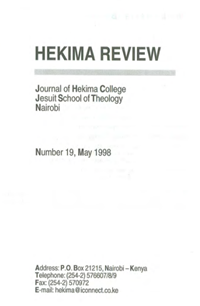
Hekima Review No. 19 (May 1998)
As we approach the third millennium, it is time to take stock. The Catholic Church has enjoined her members to set aside time to reflect on the two thousand years since the Christ event. These last three years leading up to the millennium are being devoted specifically to a prayerful reflection on the Trinity: Jesus Christ (1997), the Holy Spirit (1998), and the Father (1999). In his contemplation on the Incarnation, St. Ignatius of Loyola invites the retreatant to contemplate the Trinity as they hold a community meeting to decide how to bring salvation to our world: "I try to enter into the vision of God, in his triune life [St. Ignatius uses the words, "Three Divine Persons"), looking upon our world: men and women aimless, despairing, hateful and killing, men and women sick and dying, the old and the young, the rich and the poor, the happy and the sad, some being born and some being laid to rest. The leap of divine joy: God knows that the time has come when the mystery of his salvific plan, hidden from the beginning of the world, will become manifest." These words of St. Ignatius, published in 1548, are still relevant to our contemporary milieu.
-
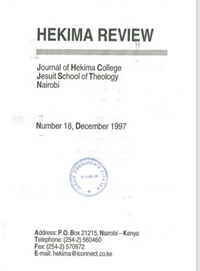
Hekima Review No. 18 (Dec 1997)
Events that happen in today's Africa witness changes all over the continent, though it is difficult to tell which direction things will take. Africa remains "dangerously" unpredictable. Significant are wars, like the recent Rwandan tragedies, the process of complete reversal of Zaire to the Democratic Republic of Congo along with the defeat of the dinosaur Mobutu. Across the river followed, all too quickly, the return of the "old crocodile" in Congo Brazzaville. Meanwhile, in South Africa, the Truth and Reconciliation Commission continues its effort to create an atmosphere of mutual trust necessary for the task of building one Nation. The Commission finds itself confronted by many deterrents to its noble task, such as remnants of the complex of white supremacy in persons like Peter Botha who do not want to apologize in public for their responsibilities in the atrocities of the apartheid system.
-

Hekima Review No. 17 (June 1997)
The work of a theologian, like that of any other social scientist, involves social insertion that culminates in action within a determinate social-historical situation. This makes a theologian a social agent But the context of action is one in which every person finds oneself, regardless of one's profession. At all times, we are either prospective agents or/and actual agents. This qualifies us as moral agents.
-
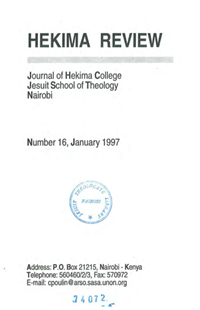
Hekima Review No. 16 (Jan 1997)
"Soldier go, soldier come"is a song by Nigerian juju musician Fela Anikulakpoti, ridiculing military dictatorship in Nigeria. He saw the military rule as perpetuating the problems of the country; each government was a problem. Fela's cry is reminiscent of the problems of Africa which the Thirty-fourth General Congregation of the Society of Jesus, cuing in from the African Synod, relates: The marginalization of Africa in the "new world order" renders an entire continent paradigmatic of all marginalized of the world. Thirty of the world's poorest countries are African. Two-thirds of the world's refugees are African. Slavery, colonial and neocolonial subjugation, internal problems of ethnic rivalry, and corruption have all created an "ocean of misfortunes" there.
-
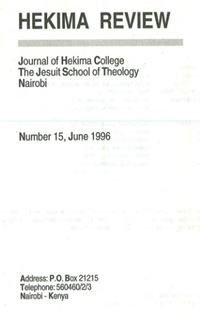
Hekima Review No. 15 (June 1996)
History has many lessons to teach us. Unfortunately, it offers us a pedagogical method with which we are not very familiar. We tend either to glibly refer to what has been as though it has no relevance for the present, or we seek "information" that may prove useful for predicting the future. But history is really an art, a skillful dialogue with what has dipped slightly below the horizon of remembrance. In the process of that dialogue, the blemished visage of the past reveals the simplicity and anguish of our fragile and sometimes brutish humanity. But history also unfurls future possibilities that the present may tend to obfuscate.
-

Hekima Review No. 14 (Jan 1996)
In the years preceding Vatican II, the official understanding of the Church was strikingly hierarchical and rigidly centralized. This was so because the life of the Church, as an institution, was organized and understood in the light of God the Father and God the Son; there was little room or no room for the Holy Spirit. Undoubtedly one of the great achievements of the Council Fathers was the reappropriation of the
active and crucial role that the Holy Spirit plays in the life of the Church. The council itself was an opportune manifestation of the ever-present activity of the Spirit in the heart of the Church. -

Hekima Review No. 13 (May 1995)
If someone had asked me three years ago if I thought I would ever be writing an editorial for Hekima Review I would have said, "No way!" My first response would have been, "What is Hekima Review?!" Three years ago I did not even know about Hekima College! When I entered the novitiate of the Augustinians of the Assumption (Assumptionists) on August 27, 1991, the possibility of coming to Africa was the last thing on my mind; not even in my wildest dreams! Then one day, two months before the end of my novitiate, the phone rang; it was my provincial and he wanted to "talk about next year" and asked me to consider coming to Nairobi for two years. Now in my third year at Hekima, my time in East Africa is drawing to a close, and in a few months, I will be back in the United States of America.
-

Hekima Review No. 12 (Jan 1995)
1995: A new year with a lot of unknowns is just before us. The unknown can be as exciting in its uncertainties as it is in its challenges and promises. It makes possible· new hopes and new dreams. Dreams of improvement in not only personal and moral conditions. but also in socio-economic conditions.

